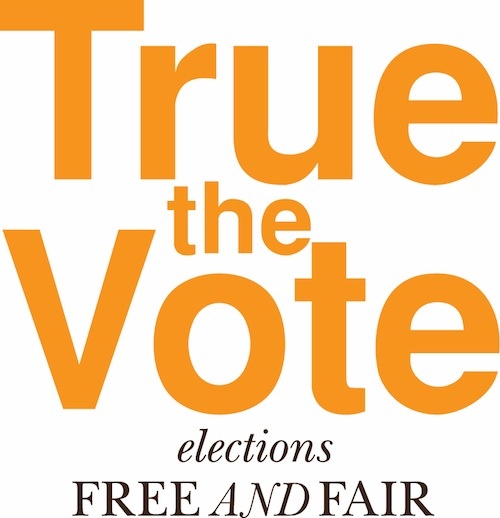True the Vote denied entry into Texas voter ID trial

Months before the conservative vote-monitoring group Judicial Watch filed to intervene in the U.S. Justice Department's lawsuit against North Carolina's restrictive new voting law, which includes a photo ID requirement, its counterparts at the Houston-based poll-monitoring nonprofit True the Vote filed the same for the Texas voter ID trial, which also involves the Justice Department.
True the Vote filed its intervention plea back in September, arguing that a ruling striking down Texas' voter ID law would "frustrate and hamper" the organization's anti-voter fraud efforts. Judge Nelva Gonzales Ramos of the U.S. District Court of Southern Texas didn't buy it and last week denied True the Vote's motion.
"The Court finds that True the Vote's intended contribution to this case may be accomplished without the necessity of, or burden incident to, making it a party," wrote Judge Ramos.
True the Vote is appealing the decision. It may still participate in the case by submitting an amicus brief in support of Texas maintaining its voter ID law.
The organization, which has been accused of voter intimidation, also attempted to intervene last year in a Florida voting rights case that was brought by the Justice Department against the state's program to purge voter rolls. Filing in support of the purges, True the Vote was joined by Judicial Watch as part of their "Election Integrity Project," which purports to promote voter "list maintenance" -- the scrubbing of allegedly ineligible voters' names from rolls -- to boost voter confidence. The federal judge in Florida denied the duo's request to intervene in that case as well.
In all three cases -- Florida last year and North Carolina and Texas this year -- Judicial Watch and True the Vote have claimed that the states' attorneys could not adequately represent the interests of all registered voters. Specifically, the organizations claim they possess a wealth of voter data from their own digging through state and county registration records that the states do not have. This exclusive data contains proof that non-citizens and dead people had either been registered to vote or voted, according to the intervention motions.
The Texas attorneys "do not possess the wellspring of data about improper voter registrations throughout Texas and other irregularities in the conduct of elections across Texas," says True the Vote's filing.
In the North Carolina case, Judicial Watch contends that the state is not likely "to make with any vigor (or at all)" the showing that same-day registration and a lack of a photo ID requirement makes elections vulnerable to fraud. If the state made such a case, Judicial Watch argues, it would open itself up to litigation under the National Voter Registration Act. That is why the group claims an "interest in maintaining the accuracy and integrity of voter rolls across the nation, including those in North Carolina."
But in both last year's Florida case and this year's Texas case, the judges ruled the groups' interests in protecting voter integrity were too general and held that the states' attorneys could adequately represent their voters.
In opposing True the Vote's intervention in Texas, the Justice Department says that the group's true desire is to gum up the legal proceedings.
"True the Vote's avowed intentions with respect to this litigation will needlessly expand the scope of discovery and related disputes and will delay timely resolution of this action," writes the Justice Department.
What the Justice Department is talking about are True the Vote's serial allegations of voter fraud in Texas and elsewhere across the nation. The organization has been making these claims for years and uses them as its rationale for why voter ID laws are needed. But there's been no evidence of significant fraud. In Texas, there were only four cases of alleged voter fraud found in the 2004 and 2008 elections out of millions of votes cast. In last year's elections, True the Vote-affiliated groups alleged voter fraud in Florida and South Carolina, but state investigations in both places turned up no fraud.
DOJ cited that as a reason the organization shouldn’t be involved in the case:
What True the Vote seeks would be a burdensome distraction from the merits of this case. Its participation would not contribute to development of a full and complete factual record necessary to support this Court's decision. To the contrary, it would divert the Court's attention to issues concerning True the Vote's numerous allegations of purported voter registration irregularities."
Judicial Watch should take note of why its peer's motion was denied, especially given that its own motion rests heavily on unsubstantiated claims of voter fraud.
However, there are some major differences between Judicial Watch's approach in North Carolina compared to True the Vote's in Texas. For one, Judicial Watch lists actual clients they seek to represent in North Carolina. One of those clients, Christina K. Gallegos-Merrill, is a former candidate for public office who accused college students of manipulating same-day registration to help defeat her. In addition, Judicial Watch claims to represent hundreds of its members in the state.
The backdrop for the resolution of these voter ID trials is the 2014 mid-term elections. In Texas, the state wanted a trial set for 2015, after the mid-terms, but the judge granted it for September 2014. In North Carolina, the full trial has been set for July 2015, but civil rights groups that sued over the law have said they intend to fight for a preliminary injunction to block the law's implementation before the elections. While the voter ID provision of North Carolina's law doesn't take effect until 2016, other provisions including a shortened early voting period are set to begin next year.
U.S. Sen. Kay Hagan (D-N.C.), who's up for re-election next year, is concerned about her chances with the voting restrictions in place and called on the Justice Department to intervene in her state.
Before a federal judge resolved a date for the North Carolina trial, the ACLU and Southern Coalition for Social Justice released a statement saying that Gov. Pat McCrory (R) wanted to delay the trial so that voter restrictions would be in place for the mid-terms.
"What is Gov. McCrory so afraid of?" asked ACLU Voting Rights Project director Dale Ho. "If he truly believes in the integrity of elections, he'd want this case resolved as soon as possible."
